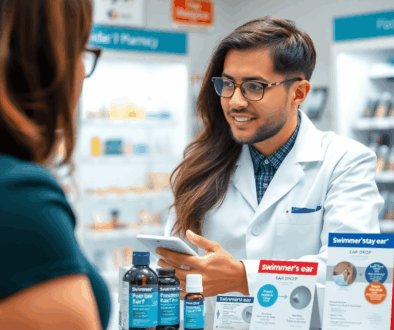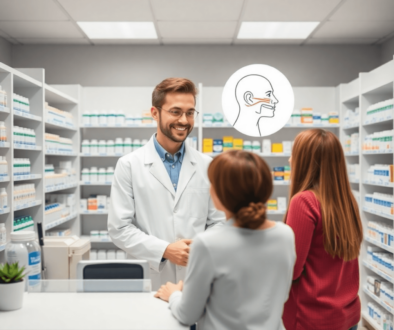Addressing Common Misconceptions About Online Prescription Safety
Addressing Common Misconceptions About Online Prescription Safety is crucial in ensuring consumer health and well-being.
Online prescription safety involves the secure and appropriate purchase, use, and storage of medications obtained online to prevent harm or misuse.
Many false beliefs impact how individuals buy and use medications online, potentially leading to risks and adverse effects such as bladder infections, which could arise from improper medication use.
The purpose of this article is to debunk common myths surrounding online prescription safety, educate readers on safe practices, and promote informed decision-making regarding online medication purchases. This includes providing insights from a pharmacy insider to help readers navigate the complexities of online medication procurement effectively.
1. Buying Medications Online Is Always Safe
Many consumers assume that purchasing medications online is inherently safe, but this belief can lead to serious health risks. The internet hosts numerous pharmacies, but not all operate with the same standards. Buying from unverified sources increases exposure to counterfeit medications, which may contain incorrect ingredients, harmful substances, or no active ingredient at all.
Safe online pharmacies, like MisterPharmacist, typically display a Verified Internet Pharmacy Practice Sites (VIPPS) certification. This accreditation, granted by the National Association of Boards of Pharmacy, signals that the pharmacy complies with strict safety and privacy standards. When you see the VIPPS seal, you can trust that the medication supplied meets quality requirements and that the pharmacy follows legal practices.
The Dangers of Counterfeit and Substandard Drugs
Counterfeit and substandard drugs pose significant dangers:
- They might cause treatment failure due to inadequate active ingredients.
- Some contain contaminants harmful to your health.
- They can lead to unexpected side effects or drug resistance.
The Importance of a Valid Prescription
A valid prescription plays a crucial role in distinguishing legitimate purchases from unsafe ones. Legitimate pharmacies require a prescription from a licensed healthcare provider before dispensing prescription medications. This step helps ensure proper diagnosis and appropriate treatment while preventing misuse or abuse of drugs.
When buying medication online, prioritize pharmacies with VIPPS certification like MisterPharmacist and never bypass the prescription process. These precautions protect both your health and your investment in effective medication.
2. Over-The-Counter (OTC) Medications Are Always Safe
The safety of OTC medications depends heavily on proper dosing and usage. These drugs are accessible without a prescription, but they are not risk-free simply because they are available over the counter. Taking more than the recommended dose or using OTC medications for longer than advised can lead to serious health problems.
Potential harms from misuse include:
- Stomach bleeding caused by excessive use of pain relievers like ibuprofen or aspirin
- Liver damage linked to overdosing on acetaminophen, which can result in serious toxicity
- Kidney issues due to prolonged use of certain anti-inflammatory drugs
Certain OTC products require special caution due to their intended short-term use. For example:
- Nasal sprays should not be used continuously for more than 3 consecutive days to avoid rebound congestion
- Eye drops often have limits on duration to prevent irritation or dependency
Knowing when to consult a healthcare provider is crucial. You should seek professional advice if:
- Symptoms persist beyond the recommended treatment period
- You experience unexpected side effects or worsening conditions
- You plan to combine OTC drugs with prescription medications
Understanding the risks associated with improper OTC medication use, such as those outlined in this article about OTC pain medications and their risks, helps you avoid complications and ensures safer self-care practices.
3. Generic Drugs Are Just as Effective as Brand-Name Drugs
A common misconception in the world of online prescriptions is that generic drugs are less effective than brand-name drugs. This belief can lead to unnecessary expenses and hesitation in choosing equally effective medications.
How Generic Drugs Work
Generic drugs contain the same active ingredients as their brand-name counterparts. Regulatory agencies, including the FDA, require generics to meet strict standards for:
- Bioequivalence: The generic must deliver the same amount of active substance into a patient’s bloodstream within the same time frame.
- Safety and efficacy: Generics undergo rigorous testing to confirm they provide identical therapeutic effects.
- Manufacturing quality: Standards ensure consistency and reliability in production.
Because of these requirements, you can trust that generic medications are just as safe and effective as brand-name drugs. For more information on how generic drugs work, you can refer to this FDA resource.
The Cost Advantage of Generic Drugs
Cost savings represent one of the most significant advantages of using generics. They usually cost substantially less because manufacturers avoid the high expenses associated with drug development and marketing faced by brand companies. Choosing generics helps reduce your overall medication costs without sacrificing quality or treatment outcomes.
However, it’s essential to be mindful about the quantity of medications being taken. Are you taking too many drugs? Discover key signs of overmedication and how to regain control of your health today! Understanding this fact supports smarter decisions when purchasing medications online, helping you avoid overpriced options while maintaining treatment effectiveness—a key point when Addressing Common Misconceptions About Online Prescription Safety.
4. Herbal Supplements Are Always Safe Because They Are Natural
Many people assume that herbal supplements are completely safe simply because they are “natural.” This belief can lead to serious herbal supplements risks that are often overlooked.
1. Lack of FDA regulation
Unlike prescription and over-the-counter medications, herbal supplements are not regulated by the FDA as drugs. This means manufacturers do not have to prove safety or effectiveness before marketing their products. The absence of rigorous oversight results in significant variability in product quality and potency.
2. Variability in potency and quality
Different brands or even batches of the same supplement can contain widely varying amounts of active ingredients. Some may fall short of labeled doses, while others might contain contaminants or undeclared substances.
3. Drug interactions
Herbal supplements can interact negatively with prescription medications. For example, St. John’s Wort may reduce the effectiveness of blood thinners or birth control pills. Ginkgo biloba can increase bleeding risk when combined with anticoagulants. These interactions can cause harmful side effects or reduce treatment efficacy.
4. Disclosure to healthcare providers
Patients often fail to mention their use of herbal supplements during medical consultations. This omission makes it difficult for providers to anticipate drug interactions or side effects accurately. Always inform your healthcare professional about any supplements you take to ensure safe, coordinated care.
5. Splitting Pills Is Always Safe to Save Money
While it might seem like a good idea to split pills in order to save money, there are significant pill splitting risks associated with this practice. Altering the structure of a pill can negatively affect its drug release and absorption. This is particularly true for certain medications that have specific coatings or are designed to be time-released; splitting these types of pills can lead to dangerous consequences.
For instance, extended-release medications are designed to dissolve slowly over time, providing a steady release of the drug into the system. If such a pill is split, it could release too much of the drug at once, leading to potential overdose or serious side effects.
Moreover, some medication coatings are specifically designed to protect the stomach or ensure that the drug is released in a certain part of the digestive system. Splitting these pills could disrupt this process and result in ineffective treatment or harm.
Therefore, it is crucial to consult with pharmacists before considering splitting any pills. They can provide valuable advice on whether it’s safe to do so for specific medications, helping avoid potential health risks.
6. Children Cannot Safely Take Smaller Doses of Adult Medications
Many people mistakenly believe that children can just take smaller doses of adult medications. But this assumption ignores an important aspect of [pediatric medication safety](https://misterpharmacist.com/uncategorized/understanding-measles-a-parents-guide-to-prevention-and-treatment), which is the significant differences in how drugs work on children compared to adults.
Why Can’t Children Just Take Smaller Doses?
Children’s bodies process drugs differently than adults because of variations in enzymes and organ function. This means that dosages must be carefully adjusted to ensure both safety and effectiveness. Giving adult medications to children without these necessary adjustments can lead to harmful effects or ineffective treatment, resulting in overdosing or underdosing.
The Importance of Pediatric-Specific Formulations
This highlights the need for medications specifically designed for children and the importance of professional guidance. Pediatric medications are created to meet children’s unique needs, such as liquid forms for easier administration and precise dosing instructions. For example, [redosing after vomiting](https://misterpharmacist.com/pharmacy-insider/pharmacy-tricks-and-tips/redosing-after-vomiting-a-guide-for-parents) in pediatric patients requires specific strategies to ensure safety.
Seeking Help from Pediatric Healthcare Providers
It’s crucial to consult healthcare providers who specialize in pediatric care for proper medication management for children. These professionals can offer valuable insights into ADHD medications in Canada, including their effectiveness, side effects, and online prescription options.
7. Medication Storage Does Not Affect Safety
Many people underestimate the importance of proper medication storage, assuming that how and where you keep your drugs won’t impact their effectiveness. This is a dangerous misconception. Medications are sensitive to environmental conditions, particularly heat and humidity effects. When exposed to these factors, many medications can degrade, lose potency, or even become unsafe.
The Unsuitable Storage Location: Bathrooms
Bathrooms are a common but unsuitable storage location. Frequent temperature fluctuations from hot showers combined with high moisture levels create an environment that accelerates drug breakdown. This can reduce a medication’s efficacy or alter its chemical composition, potentially leading to unexpected side effects or treatment failure.
Medication Storage Best Practices
Medication storage best practices include:
- Keeping medications in a cool, dry place away from direct sunlight.
- Storing them at room temperature unless otherwise specified on the label.
- Using airtight containers to minimize exposure to moisture.
- Avoiding areas prone to heat spikes, such as near stoves, ovens, or windows.
Consider locations like bedroom drawers or dedicated medicine cabinets outside of bathrooms for better control over storage conditions. Maintaining these practices protects your medications’ stability and ensures they work as intended when you need them most.
The Impact of Improper Storage on Health Conditions
It’s also worth noting that improper medication storage can exacerbate certain health conditions. For instance, the ultimate guide to beating heartburn naturally highlights how certain medications for heartburn can lose efficacy if not stored correctly. Therefore, understanding and implementing proper medication storage practices is essential for optimal health outcomes.
8. Doctors Automatically Know All Medications Patients Take
Many patients assume their doctors have a complete record of every medication they are taking. This assumption can be risky. Patient-doctor communication plays a critical role in ensuring safe and effective treatment.
You must proactively share information about all prescriptions, over-the-counter (OTC) drugs, vitamins, and supplements with your healthcare provider. Doctors rely on accurate and comprehensive data to avoid harmful drug interactions and to tailor medication plans effectively. Omitting even seemingly minor products like herbal supplements or occasional OTC pain relievers can lead to incomplete medication profiles.
Incomplete information increases the risk of dangerous interactions that may cause adverse effects or reduce the effectiveness of treatments. For example:
- Some supplements can interfere with blood thinners or blood pressure medications.
- OTC cold remedies might worsen conditions treated by prescription drugs.
- Overlapping ingredients between different products can cause unintentional overdosing.
Encouraging open communication fosters a partnership where your healthcare provider can make informed decisions based on comprehensive medication disclosure. Always bring an updated list of everything you take to appointments or use digital tools that track your medications for easier sharing.
Your safety depends on this transparency—don’t leave your doctor guessing what medicines you use. This is particularly important when dealing with serious health issues such as syphilis, which is making a comeback and requires careful management of medications to prevent further complications.
Conclusion
Promoting online prescription safety awareness starts with dispelling myths about medications that can lead to unsafe practices. You hold the key to protecting your health by staying educated and vigilant when purchasing and using medications online.
Keep these points in mind for safe medication practices:
- Always verify the legitimacy of online pharmacies before making purchases.
- Use medications exactly as prescribed or directed on labels.
- Communicate openly with healthcare professionals about all drugs, supplements, and OTC products you take.
- Question assumptions and seek reliable information instead of relying on common misconceptions.
“Safe medication use is a shared responsibility — empowering yourself with knowledge reduces risks and improves outcomes.”
Addressing Common Misconceptions About Online Prescription Safety helps you make informed decisions rather than risky guesses. Take control of your health by verifying sources and maintaining honest communication with your healthcare providers every step of the way.



